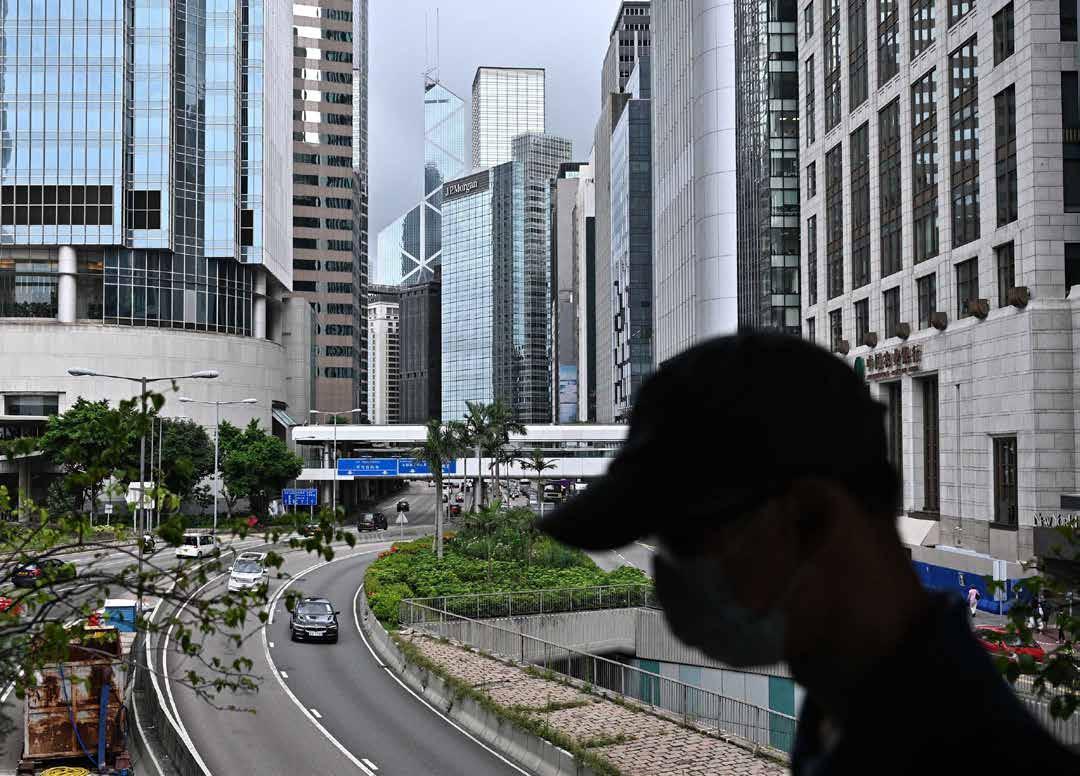
4 minute read
Finance
Bankers head south
Singapore has taken away much banking talent. Will Hong Kong be able to stop the departures?
Hong Kong has long had to accept it is no longer the leading maritime hub in Asia, but to relinquish its financial laurels to Singapore too, is a bitter pill to swallow, and one the authorities are adamant will not happen.
Hong Kong’s covid quarantines and new curbs on civil liberties have damaged the former British colony’s image as ‘Asia’s World City,’ sparked an expat exodus, and stoked rival cities’ ambitions of replacing Hong Kong as the region’s preeminent financial hub.
As Hong Kong marks the 25th anniversary of its return to Chinese sovereignty, the city’s status as an international financial and business hub is in doubt like at no point since the handover.
One survey issued in September made plenty of headlines and sparked much debate. The Global Financial Centres Index saw Singapore overtake Hong Kong to become Asia’s top financial centre - and the third in the world after moving up three places.
Singapore scored higher than Hong Kong on all five criteria – on the availability of human capital, the business environment, infrastructure, financial market development and “reputational and general.”
Hong Kong slipped to fourth place in the index, compiled by think-tanks Z/ Yen Partners and the China Development Institute, ranking 119 financial centres, using data collected from thousands of financial services professionals responding to an online questionnaire. Hong Kong financial secretary Paul Chan acknowledged the competition with Singapore in a blog post after the index results were published, laying out a series of data points to show that Hong Kong has much deeper stock, bond and asset management markets than Singapore, and remains a vital bridge to mainland China.
Hong Kong’s stock market has a value of over HK$42trn, or seven times higher than Singapore’s. There are 2,500 companies listed in Hong Kong’s stock market, around 2.7 times more than in Singapore, Chan said.
Hong Kong’s “asset and wealth management market also occupies a leading position in the region,” Chan said. “Hong Kong’s assets under the management of private equity funds is US$180bn, four times higher than Singapore.”
Practical advice for shipowners, charterers and traders from the experts in maritime law

為船東、租家和貿易商提供海商法 領域專家級的實務建議
‘They are, collectively, responsive, well-informed, astute tacticians, and very good value in comparison to some others against whom they might compete. They are an attractive offering for any client.’ ‘他們總體上反應迅速,信息靈通,是精明的策略家,與其他競爭者相比,他們的服務性價比非常高。對任何客戶來說, 他們的服務都是有吸引力的。‘
‘Hill Dickinson Hong Kong has an outstanding shipping disputes team comprising of experienced lawyers advising on both wet and dry cases.’ ‘希德律師行擁有一支優秀的航運糾紛團隊,由經驗豐富的律師組成,為航海/非航海相關的案件提供咨詢。‘
The Legal 500 Asia Pacific 2022 2022年 《法律500强香港指南》
Damien Laracy +852 2525 7528 damien.laracy@hilldickinson.com Antony Cowie +852 2525 7019 antony.cowie@hilldickinson.com
33B United Centre, 95 Queensway, Admiralty, Hong Kong Jim James +852 2525 7538 jim.james@hilldickinson.com

The city’s government attempted to put on a big global banking summit at the start of November, although in the end the event was more notable for the big names who did not show up, such as the CEOs of Barclays and Citi, and, ironically, Chan himself, down with covid.
In a survey carried out by the American Chamber of Commerce of Hong Kong last year, more than 40% of expats said they were planning to leave or considering it, mostly due to concerns over a draconian national security law imposed by Beijing, stringent covid restrictions that limit international travel and a bleak outlook for the city’s future competitiveness.
Hong Kong handed out just 32,248 work visas last year, down from 62,155 in 2017, according to the Immigration Department. Only 5,701 visas were approved for international workers under the General Employment Policy in the first half of this year, compared to 20,314 in the first half of 2018.
About 121,500 residents departed the city in the year ended June 30, leaving the population at about 7.29m, according to government data. That means the population fell 1.6%, marking the third straight year of declines and the biggest drop in at least six decades.
That exodus - the one-way ticket scenario - is one playing into Singapore’s hands, with many financial institutions - and shipping companies - relocating there. Lawrence Wong, Singapore’s finance minister and prime minister in waiting, aims to create 20,000 financial-services jobs over five years through 2025, an increase of about 10% over the current workforce. Singapore’s resident population rose 3.4% in June from a year earlier.
Fitch Ratings warned in a report earlier this year that Hong Kong’s apparent prioritisation of national strategies and governance practices over economic competitiveness may undermine the city’s role as an international financial centre.
“If these risks crystallise, it would leave the economy less dynamic, accelerate fiscal policy challenges associated with ageing and potentially contribute to downward pressure on the territory’s credit rating,” Fitch said in the report.











